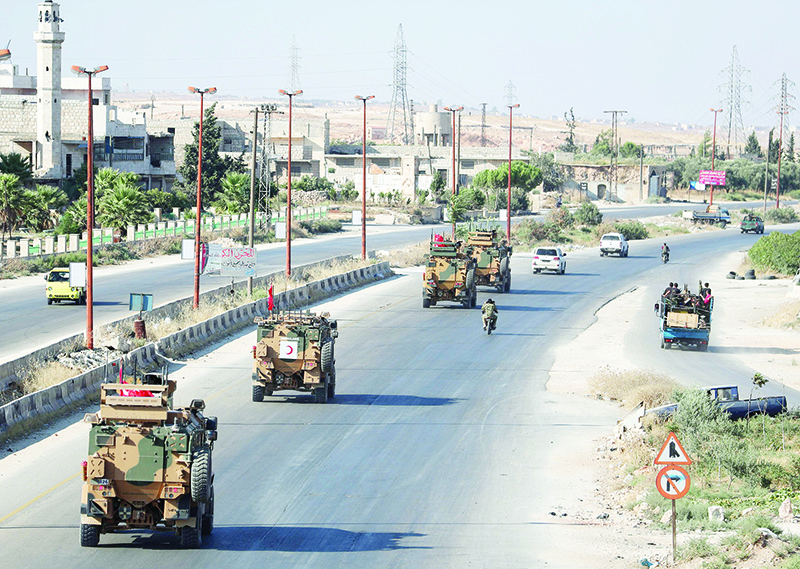
ISTANBUL: Syrian
army advances in northwest Syria are putting Turkish troops in the firing line
and threaten Ankara's hopes of preventing a new wave of refugees on its
southern border. The offensive around Idlib, the last major rebel stronghold in
Syria, has already forced tens of thousands of civilians to flee towards
Turkey. It has also cut off a Turkish military post deep inside Syria as the
deal to limit fighting in the region, which the Turkish troops were supposed to
be monitoring, collapses.
The breakdown of
that deal would be a significant blow to President Tayyip Erdogan, who has
steered Turkey closer to Russia in recent years but appears unable to rein back
Moscow's support for the Syrian army offensive. Russia, Iran and Turkey agreed
in 2017 to set up four "de-escalation zones" to stem fighting between
Syrian President Bashar al-Assad's forces and rebels, but the Syrian army has
retaken three of those areas and is now advancing in the fourth.
It has entered
the town of Khan Sheikhoun, effectively cutting off Turkish troops at a
military post near the town of Morek, 70 km (45 miles) inside Syria. A Turkish
convoy sent to resupply the Morek post was halted on Monday by an air strike.
"The situation there is of critical sensitivity," Erdogan's spokesman
Ibrahim Kalin said after a cabinet meeting on Wednesday.
Turkey, which
supports some Syrian rebel factions, has troops deployed at 12 military
observation posts around the Idlib region under the 2017 deal with Moscow and
Tehran, which back Assad's government. That agreement, and a Turkey-Russia
accord last year aimed at reducing the power of jihadist fighters in the Idlib
region, has at best had only a limited impact.
Turkey complained
that Syrian and Russia air strikes in the region continued, while Moscow grew
increasingly impatient over what it saw as Ankara's failure to stop jihadists
from the former Nusra Front taking over much of Idlib. Russia also says the
fighters in Idlib and Hama provinces threatened its Hmeymim air base, less than
40 km to the west.
Civilians flee
Turkey insists it
has no plans to abandon or move any of the military posts it set up in Idlib,
despite Monday's air strike and the fighting around Morek. "All
observation posts will continue operations where they are located right
now," Kalin said, adding that agreements to halt military operations
around Idlib must be respected.
"Otherwise,
both the violation of this agreement and the resulting humanitarian drama will
be inevitable." The United Nations says more than 500,000 people have been
uprooted since the Syrian army began its offensive in late April, most of them
escaping deeper into the rebel bastion and towards the border. Turkey, which
opened its border at the start of the Syrian conflict in 2011 and now hosts 3.6
million Syrian refugees, is determined to avoid another influx of civilians -
or fighters.
It has built a
wall along the 800 km Syrian border and says it has identified locations inside
Syria to shelter a possible wave of people fleeing the fighting in Idlib.
"If there is this kind of movement to our borders we will take action and
create shelters where we are going to accommodate displaced people outside our
borders," Interior Minister Suleyman Soylu said this week. He did not
specify whether the camps would be in Idlib province or Turkish-controlled
areas of northern Syria around the towns of Azaz, Al-Bab and Jarablus.
Staying put?
Turkey's
determination to stand by all 12 of its military posts in Idlib was reiterated
this week by the government, and a senior security official told Reuters Ankara
was standing by its troops on the ground. "Whichever observation post
needs it, support is provided, the official said.
However, that
will prove increasingly challenging for Turkey unless there is a change of
course by Moscow or Damascus, which has repeatedly said it is committed to
recapturing every inch of Syrian territory. "The Turkish observation posts
are not constituted to defend themselves and at least one of them has been
encircled by Syrian regime forces," said Ozgur Unluhisarcikli from the
German Marshall Fund. "When the risk of conflict rises too much, Turkey
will probably retreat."
Erdogan will
speak to Putin about Idlib as soon as possible, Kalin told reporters after the
cabinet meeting. Just last month, Turkish ties with Russia appeared stronger
than ever as Erdogan took delivery of advanced S-400 Russian missile defense
equipment - despite a threat of U.S. sanctions and strong lobbying by Washington
to stall the deal. Six weeks later, Moscow and Ankara's differences over
northwest Syria appear irreconcilable and Turkey's Idlib strategy is in peril.
"The end
state is clear," said Sinan Ulgen, a visiting scholar at Carnegie Europe
and a former Turkish diplomat. Pressure on the southernmost Turkish observation
posts - those which are the furthest inside Syria - would spread to other
Turkish positions as the Syrian army offensive continues, and Turkey would
likely pull some troops back. "It was a matter of time," Ulgen said.
"To me the surprise is that it happened so soon after the S-400 episode.
It proves how little leverage Turkey has gained with Russia." - Reuters










